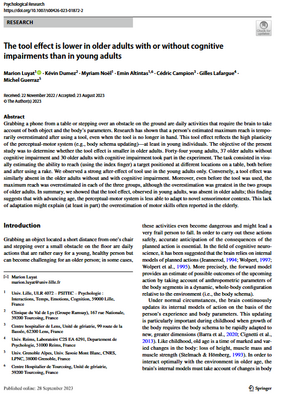Article : The tool effect is lower in older adults with or without cognitive impairments than in young adults
Parutions
The tool effect is lower in older adults with or without cognitive impairments than in young adults
Marion Luyat, Kévin Dumez, Myriam Noël, Emin Altintas, Cédric Campion, Gilles Lafargue et Michel Guerraz
Revue : Psychological Research
Abstract:
Grabbing a phone from a table or stepping over an obstacle on the ground are daily activities that require the brain to take account of both object and the body’s parameters. Research has shown that a person’s estimated maximum reach is temporarily overestimated after using a tool, even when the tool is no longer in hand. This tool effect reflects the high plasticity of the perceptual-motor system (e.g., body schema updating)—at least in young individuals. The objective of the present study was to determine whether the tool effect is smaller in older adults. Forty-four young adults, 37 older adults without cognitive impairment and 30 older adults with cognitive impairment took part in the experiment. The task consisted in visually estimating the ability to reach (using the index finger) a target positioned at different locations on a table, both before and after using a rake. We observed a strong after-effect of tool use in the young adults only. Conversely, a tool effect was similarly absent in the older adults without and with cognitive impairment. Moreover, even before the tool was used, the maximum reach was overestimated in each of the three groups, although the overestimation was greatest in the two groups of older adults. In summary, we showed that the tool effect, observed in young adults, was absent in older adults; this finding suggests that with advancing age, the perceptual-motor system is less able to adapt to novel sensorimotor contexts. This lack of adaptation might explain (at least in part) the overestimation of motor skills often reported in the elderly
